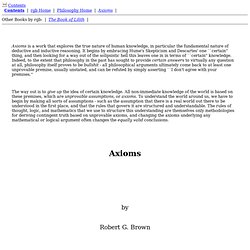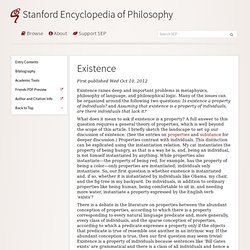

- StumbleUpon. Dan Dennett on our consciousness. The Analysis of mind, by Bertrand Russell. - StumbleUpon. Arthur M. Young: About Arthur M. Young - StumbleUpon. Axioms - StumbleUpon. Contents Contents | rgb Home | Philosophy Home | Axioms | Other Books by rgb: | The Book of Lilith | Axioms is a work that explores the true nature of human knowledge, in particular the fundamental nature of deductive and inductive reasoning.

It begins by embracing Hume's Skepticism and Descartes' one ``certain'' thing, and then looking for a way out of the solipsistic hell this leaves one in in terms of ``certain'' knowledge. Indeed, to the extent that philosophy in the past has sought to provide certain answers to virtually any question at all, philosophy itself proves to be bullshit - all philosophical arguments ultimately come back to at least one unprovable premise, usually unstated, and can be refuted by simply asserting ``I don't agree with your premises.'' The way out is to give up the idea of certain knowledge.
Axioms by Robert G. Dedication No book is written in a vacuum. Notice Copyright Notice Copyright Robert G. Lulu Press www.lulu.com.
Thebigview.com - Pondering the Big Questions - StumbleUpon. Friedrich Nietzsche (Stanford Encyclopedia of Philosophy) - StumbleUpon. 1.

Life: 1844–1900 In the small German village of Röcken bei Lützen, located in a rural farmland area southwest of Leipzig, Friedrich Wilhelm Nietzsche was born at approximately 10:00 a.m. on October 15, 1844. The date coincided with the 49th birthday of the Prussian King, Friedrich Wilhelm IV, after whom Nietzsche was named, and who had been responsible for Nietzsche's father's appointment as Röcken's town minister. Nietzsche's uncle and grandfathers were also Lutheran ministers, and his paternal grandfather, Friedrich August Ludwig Nietzsche (1756–1826), was further distinguished as a Protestant scholar, one of whose books (1796) affirmed the “everlasting survival of Christianity.” When Nietzsche was nearly 5 years old, his father, Karl Ludwig Nietzsche (1813–1849) died from a brain ailment (July 30, 1849) and the death of Nietzsche's two-year-old brother, Ludwig Joseph, traumatically followed six months later (January 4, 1850). 2. 3.
Existence (Stanford Encyclopedia of Philosophy) - StumbleUpon. First published Wed Oct 10, 2012 Existence raises deep and important problems in metaphysics, philosophy of language, and philosophical logic.

Many of the issues can be organized around the following two questions: Is existence a property of individuals? And Assuming that existence is a property of individuals, are there individuals that lack it? What does it mean to ask if existence is a property? A full answer to this question requires a general theory of properties, which is well beyond the scope of this article. There is a debate in the literature on properties between the abundant conception of properties, according to which there is a property corresponding to every natural language predicate and, more generally, every class of individuals, and the sparse conception of properties, according to which a predicate expresses a property only if the objects that predicate is true of resemble one another in an intrinsic way. 1. Russell's strategy depends on two claims. A&[Internet Encyclopedia of Philosophy] - StumbleUpon.
Nature of Science - Feynmans analogy of science and chess - StumbleUpon. Alan Watts discusses Nothing - StumbleUpon. Showing all quotes that contain Feynman. - StumbleUpon. UC Berkeley - Download free content from UC... - StumbleUpon. Search results for "charles bukowski" (showing 1-20 of 498 quotes) - StumbleUpon.
The World As I See It - StumbleUpon. "How strange is the lot of us mortals!

Each of us is here for a brief sojourn; for what purpose he knows not, though he sometimes thinks he senses it. But without deeper reflection one knows from daily life that one exists for other people -- first of all for those upon whose smiles and well-being our own happiness is wholly dependent, and then for the many, unknown to us, to whose destinies we are bound by the ties of sympathy. A hundred times every day I remind myself that my inner and outer life are based on the labors of other men, living and dead, and that I must exert myself in order to give in the same measure as I have received and am still receiving... "I have never looked upon ease and happiness as ends in themselves -- this critical basis I call the ideal of a pigsty. The ideals that have lighted my way, and time after time have given me new courage to face life cheerfully, have been Kindness, Beauty, and Truth.
"My political ideal is democracy. The Molecular Biology of Paradise - StumbleUpon. 40 Belief-Shaking Remarks From a Ruthless Nonconformist. If there’s one thing Friedrich Nietzsche did well, it’s obliterate feel-good beliefs people have about themselves.

He has been criticized for being a misanthrope, a subvert, a cynic and a pessimist, but I think these assessments are off the mark. I believe he only wanted human beings to be more honest with themselves. He did have a remarkable gift for aphorism — he once declared, “It is my ambition to say in ten sentences what others say in a whole book.” A hundred years after his death, Nietzsche retains his disturbing talent for turning a person’s worldview upside-down with one jarring remark. Even today his words remain controversial. Here are 40 unsympathetic statements from the man himself. 1. 2. 3. 4. 5. 6. 7. 8. 9.